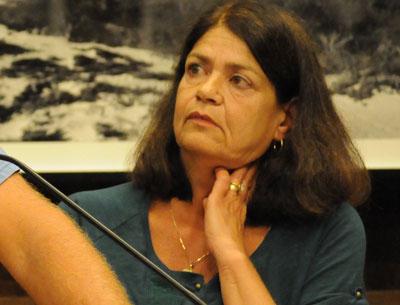Carters Plead: Don’t Close the Plant

The owners of cesspool-pumping businesses turned out en masse last Thursday night to tell the East Hampton Town Board hearing that closing the scavenger waste plant, in use in recent months as a transfer station only, would have a profound effect on them — in some cases, putting them out of business.
Representatives of five different waste carters said they offloaded septic waste at the plant, contrary to what the board had been told in a report issued by the budget and finance committee. The committee recommended temporary closure of the waste-transfer site until long-term decisions about the future of the plant could be made, based in part on a finding that only one firm, the John K. Ott Cesspool Company, was using the plant.
“This board cannot make a decision . . . when they’re given inaccurate information,” said Lucille Garypie, who owns that company with her husband, Eugene Garypie.
John K. Ott, she said, is the predominant user of the plant, which can take in only a limited number of gallons of waste per day. When capacity is reached, carters must drive to facilities in Riverhead or at Bergen Point in Babylon to dump. While Ott, with two trucks, can “make do,” Ms. Garypie said, others cannot.
Jason Libath, a part owner of J & J, a new septic-waste business, said that due to the limited capacity at East Hampton’s plant, he has had to tell restaurants that have called for a pump-out that he cannot help them. “We’re not set up to go to Riverhead,” he said. “If this plant shuts down, we might shut down, too.” A representative of Schenck Cesspool Service said the situation for his company is the same.
John Stafford of the McMahon company urged the town board to reopen the town’s facility as a waste-treatment plant. Among the important considerations, he said, is the impact on residents and business owners as septic waste carters set prices commensurate with their costs. The two UpIsland plants, he said, charge carters the full cost of dumping a truckload of waste, regardless of how much the truck actually contains. And, he said, East Hampton’s transfer station, at a rate of 13.5 cents per gallon, is “currently unaffordable.”
For several days last week, he said, his company was unable to dump a full truckload of waste as the transfer station was full up. “I ask you to give careful consideration to all of this, as it could cost us all a lot of money,” he said.
“The transfer station as we know it doesn’t fit the needs of this community,” said Arthur Malman, a member of the budget and finance advisory committee. The committee’s review of plant manifests, he said, had shown that “almost all the waste being dumped there was from Ott,” leading to the conclusion that other companies did not use the plant.
The town board is grappling with the larger question of what to do about the waste treatment plant — rehab and reopen it, privatize it, or shut it for good. The issue has been under discussion for more than a year, and a majority of the board members recently agreed to seek proposals from consultants who could help the town prepare an overall septic-waste management plan, which would inform specific decisions about the scavenger waste plant.
A number of companies have responded, and the proposals will be vetted after the Oct. 8 submission deadline.
Town Supervisor Bill Wilkinson and Councilwoman Theresa Quigley have disagreed with that approach. They supported accepting a bid from a company that would have leased the plant and eventually purchased it. The other board members did not find the terms favorable to the town and said that related issues, such as environmental conditions and potential groundwater pollution, should be addressed before moving forward.
